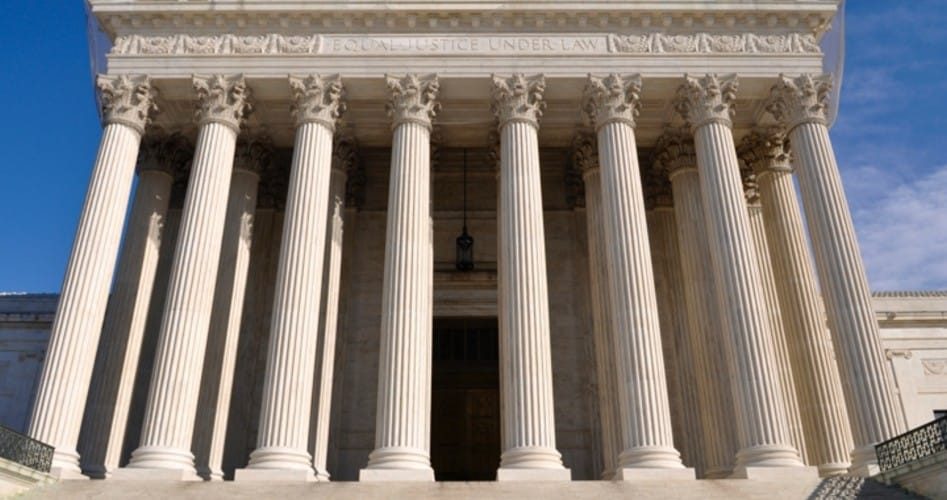
Most of the criticism leveled against U.S. District Judge for the Eastern District of Wisconsin Lynn S. Adelman’s article — “The Roberts Court’s Assault on Democracy” — focused on the judge’s support of positions that Socialist Bernie Sanders would embrace: free health insurance for everyone, voting rights for everyone including illegals, prohibiting corporations from supporting political positions financially, taking political redistricting away from local jurisdictions, and so forth.
But a closer look at his 35-page article to be published shortly by the Harvard Law & Policy Review reveals a basic misunderstanding of the political structure that the Founders attempted to create through the U.S. Constitution.
Adelman (no relation to this writer) opens with a bald attack on the character of U.S. Supreme Court Chief Justice John Roberts:
Chief Justice John Roberts’ statement … that a Supreme Court’s role is a passive one — an “umpire who calls balls and strikes” — was a masterpiece of disingenuousness. Roberts’ misleading testimony inevitably comes to mind when one considers the course of decision-making by the Court over which he presides.
It’s accurate to note that this is how the judge phrases his charges that Roberts is a liar. But this misses the point. What Adelman does is expose the kind of constitutional thinking and teaching to which he was subjected, and bought into, while earning his degrees from Princeton and Columbia.
{modulepos inner_text_ad}
He claims, for example, that those decisions by the Supreme Court “are undermining the democratic republic that the American people … have fought for.” He cites “a number of cases [decided by the Roberts Court] which, taken together, constitute a direct assault on the right of poor people and minorities to vote [while they have] increased the economic and political power of corporations and wealthy individuals and reduced that of ordinary Americans and entities that represent them, like labor unions.”
This is of course the siren song that Marxists like Sanders have used to beguile the uninformed citizen that the federal government is the enemy. Said Adelman: “A government loses its character as a democracy (emphasis added) when its leaders stop devoting their efforts to benefitting the public … and instead serve the interests of a minority.”
The challenge, according to Adelman, is that “we desperately need public officials who will work to revitalize our democratic republic. Unfortunately, the conservative Justices on the Roberts Court are not among them. It will take every bit of democratic resourcefulness that we can muster to undo the damage that the Court has already caused.”
What this plaint reveals is his frustration at the success of the Trump administration to begin to restore originalism to the thinking and the opinions of not only the Supreme Court but the inferior courts as well. As attorney, author, and Fox News commentator Gregg Jarrett expressed it, it is Adelman’s “contention that democracy is on the precipice because conservatives hold a 5-4 majority on the Supreme Court.”
The precipice to which Jarrett refers is that of erasing all vestiges of the constitutional republic that the Founders determined to construct, and turning it into the democracy that they labored so mightily to avoid.
Alexander Hamilton warned about the dangers of a pure democracy: “It has been observed that a pure democracy, if it were practicable, would be the most perfect government. Experience has proved that no position is more false than this. The ancient democracies in which the people themselves deliberated never possessed one good feature of government. Their very character was tyranny; their figure, deformity.”
Hamilton was joined by President John Quincy Adams: “The experience of all former ages had shown that of all human governments, democracy was the most unstable, fluctuating and short-lived.”
And not only were those democracies unstable and short-lived, they were violent in their dying. Said James Madison: “Democracies have ever been spectacles of turbulence and contention; have been found incompatible with personal liberty and the rights of property; and have in general been as short in their lives as they have been violent in their deaths.”
Added John Adams: “Remember, democracy never lasts long. It soon wastes, exhausts and murders itself. There never was a democracy yet that did not commit suicide.”
Whether the president’s determination to restore that sort of originalism to the highest court and inferior courts before the country plunges off that precipice into anarchy and then tyranny remains to be seen. For his efforts, Judge Adelman has been applauded by those seeking to replace our constitutional republic with an unbridled democracy, including the Washington Post, Slate and the ABA Journal.
Does Adelman have any regrets over igniting the firestorm with his article? He backpedaled when asked that question by an interviewer with the National Law Journal: “I guess I’d like to steer clear of anything political. I guess I’ve just, by writing this, I think I’ve sort of gotten more into it than I wanted, frankly.”
It’s too late for regrets. Adelman has clearly and beautifully exposed the anti-constitutional bias that has, until very recently, infected the Supreme Court and many of the lower courts. He exposed the dangers of democracy that informed and galvanized the Founders in their attempt to create a constitutional republic to protect the citizenry from those fatal dangers.
In that regard, Adelman has unwittingly served the cause of freedom.
An Ivy League graduate and former investment advisor, Bob is a regular contributor to The New American, writing primarily on economics and politics. He can be reached at [email protected].



